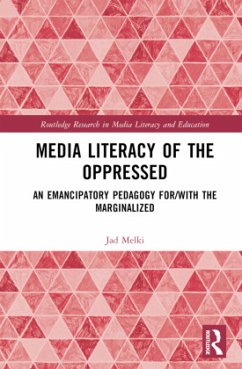This book offers an alternative approach to developing media literacy pedagogies for marginalized communities and people in postcolonial countries, especially in the Global South, tackling unexplored issues such as media literacy of war, terrorism, pandemics, infodemics, populism, colonialism, genocide, and intersectional feminism.
With an emphasis on developing critical and emotive consciousness - or unveiling the oppressor within - the book provides a unique perspective that fits the needs of people at the margins and challenges mainstream media literacy approaches that are mainly designed for the center and the Global North. The book offers a framework for designing curricula at and with the margins through an emancipatory media literacy approach. This approach directs energy toward resistance and praxis, focuses on local priorities of the margins, contextualizes issues within a postcolonial historical moment, and concentrates on fighting oppression structures and social injustice.
This book will be an important resource for scholars, educators, and students of media literacy, communication, cultural studies, critical pedagogy, health communication, postcolonialism, Arab studies, feminism, and human rights.
With an emphasis on developing critical and emotive consciousness - or unveiling the oppressor within - the book provides a unique perspective that fits the needs of people at the margins and challenges mainstream media literacy approaches that are mainly designed for the center and the Global North. The book offers a framework for designing curricula at and with the margins through an emancipatory media literacy approach. This approach directs energy toward resistance and praxis, focuses on local priorities of the margins, contextualizes issues within a postcolonial historical moment, and concentrates on fighting oppression structures and social injustice.
This book will be an important resource for scholars, educators, and students of media literacy, communication, cultural studies, critical pedagogy, health communication, postcolonialism, Arab studies, feminism, and human rights.








